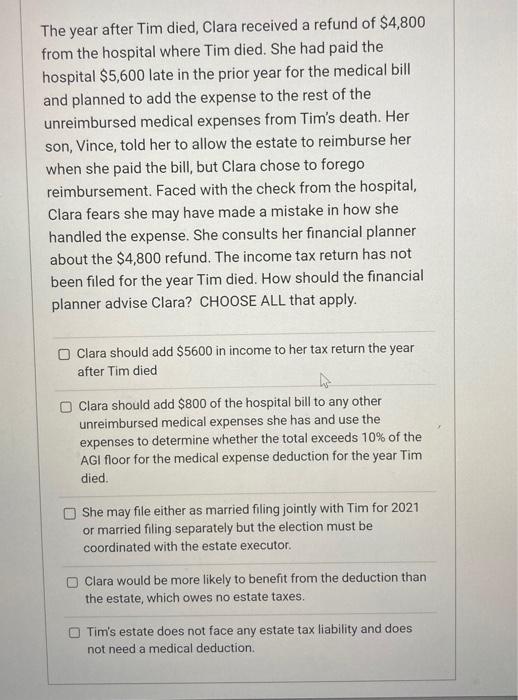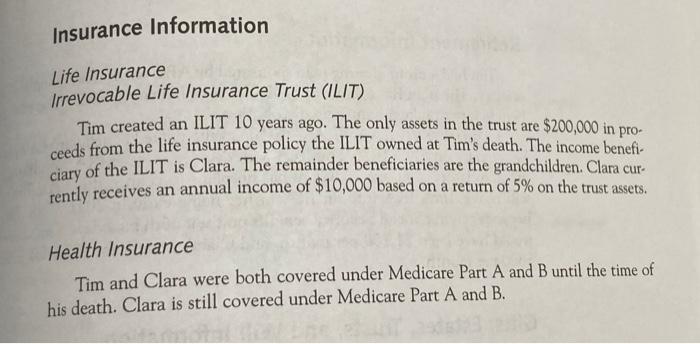Answered step by step
Verified Expert Solution
Question
1 Approved Answer
The year after lim died, Clara received a refund of $4,800 from the hospital where Tim died. She had paid the hospital $5,600 late in
The year after lim died, Clara received a refund of $4,800 from the hospital where Tim died. She had paid the hospital $5,600 late in the prior year for the medical bill and planned to add the expense to the rest of the unreimbursed medical expenses from Tim's death. Her son, Vince, told her to allow the estate to reimburse her when she paid the bill, but Clara chose to forego reimbursement. Faced with the check from the hospital, 

The year after Tim died, Clara received a refund of $4,800 from the hospital where Tim died. She had paid the hospital $5,600 late in the prior year for the medical bill and planned to add the expense to the rest of the unreimbursed medical expenses from Tim's death. Her son, Vince, told her to allow the estate to reimburse her when she paid the bill, but Clara chose to forego reimbursement. Faced with the check from the hospital, Clara fears she may have made a mistake in how she handled the expense. She consults her financial planner about the $4,800 refund. The income tax return has not been filed for the year Tim died. How should the financial planner advise Clara? CHOOSE ALL that apply. Clara should add $5600 in income to her tax return the year after Tim died Clara should add $800 of the hospital bill to any other unreimbursed medical expenses she has and use the expenses to determine whether the total exceeds 10% of the AGI floor for the medical expense deduction for the year Tim died. She may file either as married filing jointly with Tim for 2021 or married filing separately but the election must be coordinated with the estate executor. Clara would be more likely to benefit from the deduction than the estate, which owes no estate taxes. Tim's estate does not face any estate tax liability and does not need a medical deduction. Insurance Information Life Insurance Irrevocable Life Insurance Trust (ILIT) Tim created an ILIT 10 years ago. The only assets in the trust are $200,000 in proceeds from the life insurance policy the ILIT owned at Tim's death. The income beneficiary of the ILIT is Clara. The remainder beneficiaries are the grandchildren. Clara currently receives an annual income of $10,000 based on a return of 5% on the trust assets. Health Insurance Tim and Clara were both covered under Medicare Part A and B until the time of his death. Clara is still covered under Medicare Part A and B Clara fears she may have made a mistake in how she handled the expense. She consults her financial planner about the $4,800 refund. The income tax return has not been filed for the year Tim died. How should the financial planner advise Clara? CHOOSE ALL that apply.


Step by Step Solution
There are 3 Steps involved in it
Step: 1

Get Instant Access to Expert-Tailored Solutions
See step-by-step solutions with expert insights and AI powered tools for academic success
Step: 2

Step: 3

Ace Your Homework with AI
Get the answers you need in no time with our AI-driven, step-by-step assistance
Get Started


